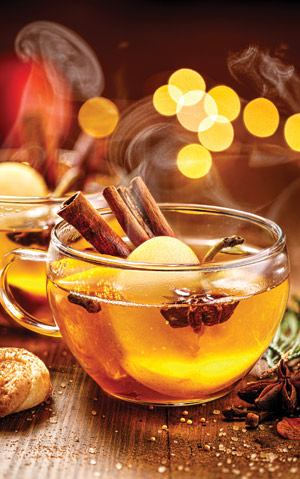
By Jonathan Evans
Herbal Information Specialist for the Herbarium
Happy holidays to all! We have made it through Thanksgiving and now comes the real test. House parties, office parties, family and neighbor get togethers all mean eating and drinking foods we are not accustomed to – and in greater quantities than we should consume.
All of this can overwhelm our digestive system and turn happy times into not so happy times. I have a few suggestions to help you through the holiday indulgences.
Taming holiday tummy
If you are the host, you might want to have peppermints available to help soothe your guest’s tummies, or slices of papaya to aid in digestion. Dried papaya is delicious and will help with protein digestion. Perhaps some ginger candy or tea can also be available, and chamomile is always a great herbal tea to have handy.
For those of you who may have more than occasional heartburn or indigestion, digestive bitters or enzymes could be the answer. Bitters, as the name implies, are bitter herbs to stimulate your bile production and facilitates stomach acid.
Enzymes are complex proteins produced by living cells and start the chemical reactions of digestion. Without enzymes, digestion could not take place and our food could not be absorbed and utilized by our bodies. Any formula should contain a good cross section of enzymes but most importantly, it should contain three main enzymes: Amylase for carbohydrates, protease for protein and lipase for fat.
For those of you who inhale food, it is important to note that digestion begins with mastication, or chewing. Saliva contains amylase, which initiates the digestion of dietary starches. And please chew with your mouth closed. It does not aid in your digestive process but it is very helpful to the digestion of observers.
Some people will skip using enzymes and go straight to betaine hydrochloride with pepsin, which is what is in your stomach. According to Jonathan Wright, MD, most acid indigestion in people over 40 is due to a lack of adequate acid, not too much. We have a fine article by Dr. Wright available at the Herbarium that explains this in detail.
Dr. Wright notes the acid problem is mostly an “advertising driven myth.”
“But Jonathan, I have heartburn, gas and GERD,” I hear customers say. I understand that, and when you read the articles we have that detail what is actually going on you will understand more about the problem, the symptoms and the remedy.
Make the most of mulling
This time of year brings one of the great pleasures of New England – mulled cider or wine as a seasonal treat. There is nothing like walking into a kitchen with the mulling spices simmering away in whatever beverage you enjoy. Here is a little fun fact – mulling spices have been used for centuries, usually associated with wine. Why? Because it flavored wine with exotic spices and hid the fact that the wine was going bad or was of poor quality.
Today of course, we enjoy mulled beverages purely for the taste, but did you know there is scientific evidence that the spices used have very powerful medicinal value? Our mix of mulling spice includes cinnamon, cloves, star anise, allspice, and orange peel has health benefits for the imbiber:
Cinnamon has antioxidant, anti inflammatory and anti-diabetic properties.
Cloves are antibacterial, antioxidants, good for liver health and ulcers.
Star anise contains several volatile oils that work well for coughs and flu and aids digestion and eliminate gas.
Allspice berries are antifungal, anti-inflammatory, antiseptic, sedating and have antioxidant action.
Orange peel contains polyphenols, which help with digestion, brain health and cardiovascular issues. Wow! And you thought mulled cider or wine just tasted good.
Coping with S.A.D.
Finally, we have entered the S.A.D. – Seasonal Affective Disorder– time. S. A. D. is a type of depression related to the change of season and lack of sunlight. It can make people listless, moody and “blue”. Using full spectrum light bulbs – which mimic sunlight – can help. Melatonin helps to reset your body clock and circadian rhythms. Taking extra B complex for stress and energy, and vitamin D for depression and general health, can also be helpful. In fact, with the lack of sunshine this time of year, taking more D is very important. The herbs Kava kava and or St. John’s wort can help with depression and anxiety.
These simple remedies can make this time of year a lot more bearable and enjoyable.
Happy New Year!
— Jonathan
Send questions on botanical remedies to: Natures Rx: Jonathan Evans at herbarium258@gmail.com or by regular mail to: The Herbarium, 264 Exchange St., Chicopee, MA 01013. If requesting additional info, include a self-addressed stamped envelope.